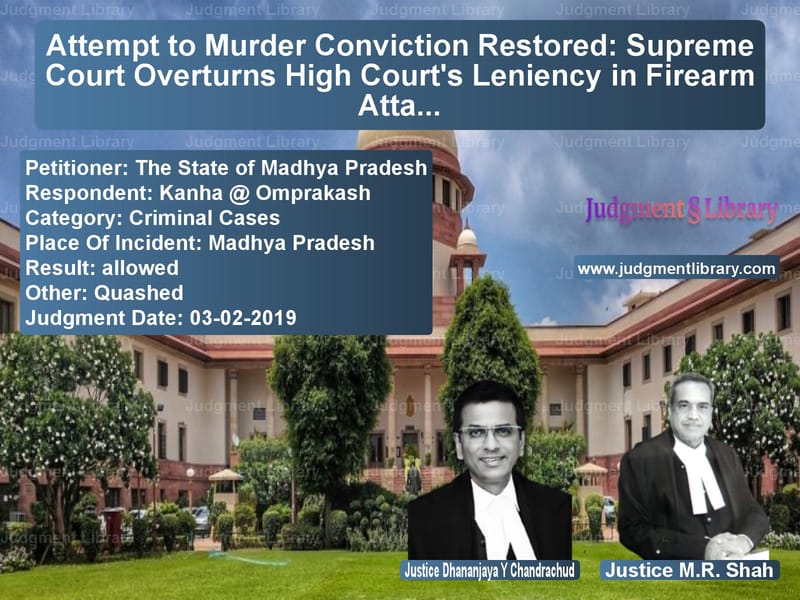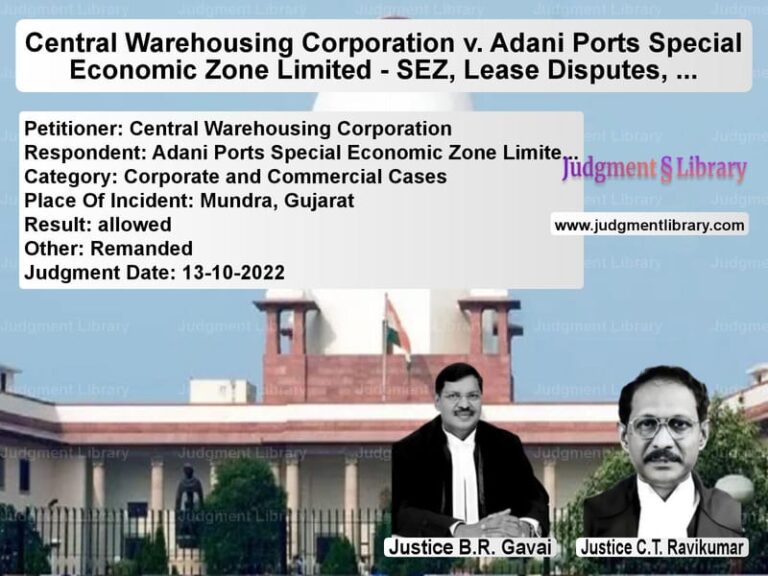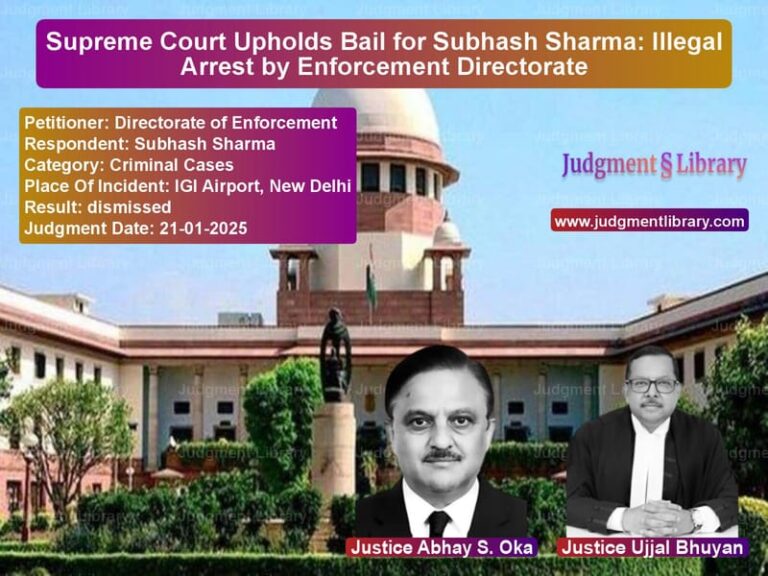Attempt to Murder Conviction Restored: Supreme Court Overturns High Court’s Leniency in Firearm Attack Case
The case of The State of Madhya Pradesh vs. Kanha @ Omprakash is a crucial Supreme Court ruling addressing the elements required to establish an attempt to murder under Section 307 of the Indian Penal Code (IPC). The case involved a firearm attack during a longstanding dispute, in which the Trial Court convicted the accused under Section 307 IPC, but the High Court later reduced the conviction to Section 324 IPC (voluntarily causing hurt by dangerous weapons or means). The Supreme Court ultimately restored the conviction under Section 307 IPC, emphasizing that an actual grievous or life-threatening injury is not a prerequisite for a conviction under this section.
Background of the Case
The prosecution alleged that on 8th October 2003, an altercation occurred between two rival groups in Gwalior, Madhya Pradesh. The accused, Kanha @ Omprakash, allegedly fired a gun at Dashrath Singh, causing multiple punctured wounds on his right thigh. The attack was reportedly motivated by a previous dispute related to a love marriage and a business rivalry over a cable disc connection.
The injured victim’s brother immediately filed a complaint at the local police station. The police registered a case under Sections 147 (rioting), 307 (attempt to murder) read with 149 IPC (unlawful assembly), and 323 IPC (voluntarily causing hurt). Seven other co-accused were later acquitted, leaving only Kanha @ Omprakash to face trial.
Trial Court Conviction
The Trial Court found that:
- The accused had fired a firearm at the victim, causing 11 punctured wounds.
- The injuries were inflicted within six hours before the medical examination.
- The medical reports confirmed that the wounds were firearm-related.
- The complainant and eyewitnesses corroborated the sequence of events.
On this basis, the Trial Court convicted the accused under Section 307 IPC and sentenced him to three years of rigorous imprisonment with a fine of Rs. 1,000.
High Court’s Leniency
The accused challenged his conviction before the Madhya Pradesh High Court. The High Court:
- Reduced the conviction from Section 307 IPC (attempt to murder) to Section 324 IPC (voluntarily causing hurt by dangerous weapons).
- Reduced the sentence to 40 days of imprisonment (already undergone) and imposed a fine of Rs. 3,000.
- Held that since the prosecution had not proved that the injuries were “grievous” or “life-threatening,” the accused could not be convicted under Section 307 IPC.
Dissatisfied with the reduction in conviction and sentence, the State of Madhya Pradesh appealed to the Supreme Court.
Arguments Before the Supreme Court
Appellant (State of Madhya Pradesh) Arguments
- The High Court ignored crucial medical evidence confirming multiple gunshot wounds.
- Under Section 307 IPC, an actual fatal injury is not necessary—only the intention and attempt to commit murder are required.
- The firearm used and the severity of the attack indicated a clear attempt to kill.
- The accused’s reduced sentence of just 40 days was inadequate for such a serious offense.
Respondent (Kanha @ Omprakash) Arguments
- The injuries were not proven to be life-threatening or grievous.
- The prosecution failed to establish intent to kill.
- Since the injuries were “simple,” the case fell under Section 324 IPC, not Section 307 IPC.
Supreme Court’s Observations and Judgment
1. Nature of Injuries and Weapon Used
The Supreme Court noted:
- The victim sustained 11 firearm wounds, clearly caused by a gun.
- While no “blackening” was found around the wounds, the presence of metallic density in X-ray reports confirmed gunshot injuries.
- Since a gun was used, the attack was inherently dangerous and could have led to death.
2. Legal Interpretation of Section 307 IPC
The Supreme Court emphasized that a conviction under Section 307 IPC does not require proof of a grievous or life-threatening injury. The Court cited previous rulings:
“An attempt in order to be criminal need not be the penultimate act. It is sufficient in law if there is present an intent coupled with some overt act in execution thereof.”
Referring to State of Maharashtra v. Balram Bama Patil (1983), the Court reiterated:
“To justify a conviction under Section 307 IPC, it is not essential that bodily injury capable of causing death should have been inflicted.”
3. High Court’s Error in Reducing Conviction
The Supreme Court found that the High Court had overlooked key medical evidence and legal principles. The Court stated:
“The High Court erred in reducing the conviction to Section 324 IPC when clear evidence of an attempt to murder was present.”
Final Judgment
The Supreme Court:
- Set aside the High Court’s judgment.
- Restored the conviction under Section 307 IPC.
- Reinstated the original sentence of three years of rigorous imprisonment.
- Ordered the accused to surrender immediately to serve the remaining sentence.
Legal Implications of the Judgment
This ruling has several significant implications:
- Clarification on Section 307 IPC: A fatal injury is not necessary; the attempt and intent are sufficient.
- Limited Judicial Leniency: Courts should not reduce serious convictions without strong justification.
- Weapon Usage as an Indicator: The use of a firearm itself can establish an attempt to murder.
- Strict Sentencing: Courts should impose proportionate punishment to deter violent crimes.
Conclusion
The Supreme Court’s decision in The State of Madhya Pradesh vs. Kanha @ Omprakash upholds the legal principle that intent and attempt are the core elements of an attempt to murder charge. The ruling ensures that leniency is not granted in cases involving dangerous weapons, reinforcing the deterrent value of strict sentencing in serious criminal offenses.
Petitioner Name: The State of Madhya Pradesh.Respondent Name: Kanha @ Omprakash.Judgment By: Justice Dhananjaya Y Chandrachud, Justice M.R. Shah.Place Of Incident: Madhya Pradesh.Judgment Date: 03-02-2019.
Don’t miss out on the full details! Download the complete judgment in PDF format below and gain valuable insights instantly!
Download Judgment: The State of Madhya vs Kanha @ Omprakash Supreme Court of India Judgment Dated 03-02-2019.pdf
Direct Downlaod Judgment: Direct downlaod this Judgment
See all petitions in Attempt to Murder Cases
See all petitions in Judgment by Dhananjaya Y Chandrachud
See all petitions in Judgment by Mukeshkumar Rasikbhai Shah
See all petitions in allowed
See all petitions in Quashed
See all petitions in supreme court of India judgments February 2019
See all petitions in 2019 judgments
See all posts in Criminal Cases Category
See all allowed petitions in Criminal Cases Category
See all Dismissed petitions in Criminal Cases Category
See all partially allowed petitions in Criminal Cases Category







